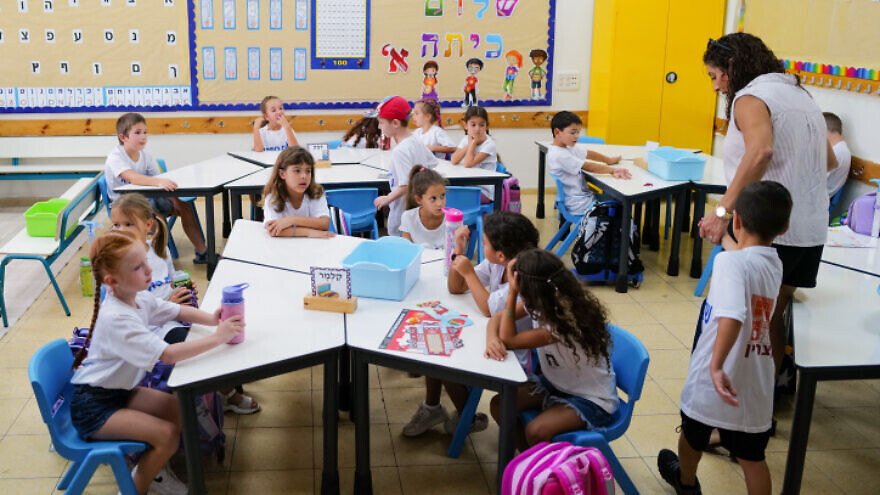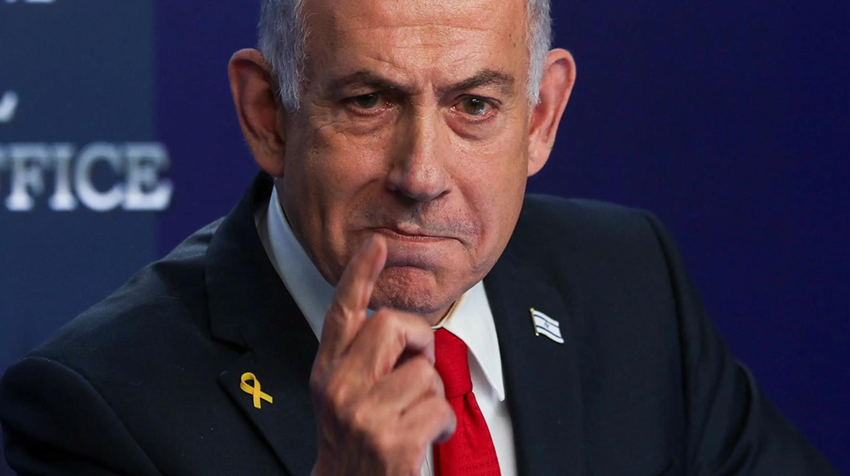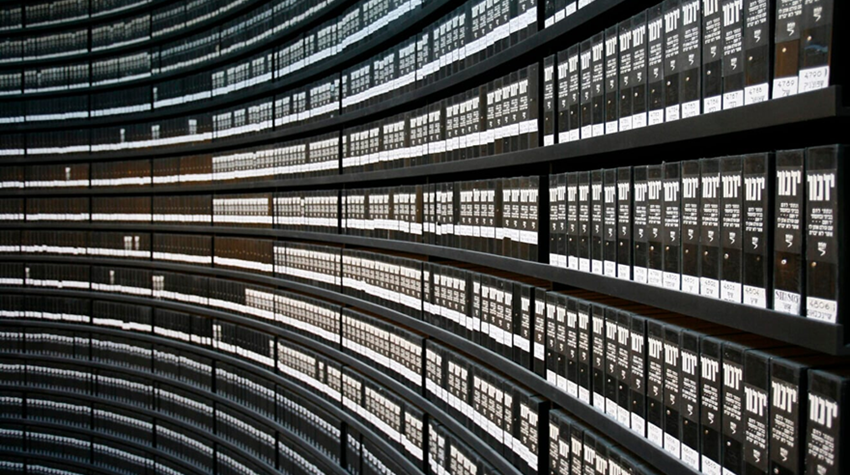Israeli students. Credit: Michael Giladi/Flash90
David Isaac - JNS
Concerned Israeli parents are complaining that their children aren’t learning even the basics of Judaism in the country’s public schools. Activists say the issue goes beyond a failure to teach, claiming that there’s a concerted effort to replace Jewish content with progressive material, financed largely by foreign actors. Still in its early stages, the movement echoes the fight against “wokeism” in the United States, where parents battle school boards over what they see as left-wing indoctrination of their children.
Israeli activists say that in Israel’s case progressive groups are motivated by the goal of turning Israel from a Jewish state into a “state of all its citizens” (meaning one devoid of any meaningful Jewish features), so as to slip easier into the progressive vision of the world as a global village.
“Everything that happens in the United States eventually comes to Israel. We already see the woke agenda every now and then. It’s not yet as it is in the American system, and we have a chance to stop it before it really does damage,” said Roni Sassover, a Tel Aviv attorney who founded Parents’ Forum for Tradition, a group of secular parents concerned about the lack of Jewish religious education in state schools.
There are three educational branches for Jewish students within Israel’s school system: 1) secular state schools; 2) religious state schools and 3) haredi, or ultra-Orthodox, schools. Critics here are referring to the secular state schools, which account for 56%, or 833,881, of Israel’s Jewish students, according to Education Ministry figures.
Sassover founded her group to alert parents to what’s happening. “The whole education system is very different from what it used to be when we were growing up. And many parents believe that it’s still the same, so they don’t even think to ask,” she said. “When they hear that kids aren’t studying the Bible, they tell me, ‘Whatever you need.’ ”
Sassover’s wakeup call came when her eight-year-old daughter, along with her entire class, received a Torah, or the five books of Moses, during a special presentation ceremony. Sassover said she got a shock when she opened the gold-covered book to discover the pages were completely blank. Demanding an explanation from the teacher, she was told that instead of a Torah, the students now receive a “travel journal.” The idea is that the students are to write their own Torah, made up of their feelings, beliefs and aspirations.
Sassover said the reason parents don’t know what’s going on is that those behind the changes are working “under the radar,” precisely so parents don’t rise up. They want to present parents with a fait accompli, she explained.
Perhaps the most blatant example was provided by Avi Maoz, leader of the Noam Party, who in a Dec. 5 press conference referred to a case in which a school used code words to hide from parents the fact that students were meeting a controversial group that espoused a pro-Palestinian narrative.
In Israel’s new government, Moaz will take charge of a department in the Education Ministry overseeing external programming and partnerships, which is responsible for managing non-official groups that provide content and programming for Israel’s school system. The appointment sparked an outcry from Maoz’s detractors, who zeroed in on his anti-LGBTQ views. Over 50 local municipalities signed a protest letter saying they would oppose any attempt by Maoz to introduce an extremist agenda. His supporters contend that he will only root out the progressive extremist agenda that has already taken hold.
Maoz says his chief object is reinforcing Israel’s Jewish identity. On Feb. 7, 2022, he launched the Knesset “Lobby for Strengthening and Preserving Jewish Identity in Israel.” Netanyahu attended the launch, signaling that he regards the issue as important. Sassover has been tapped as the lobby’s director.
Oren Henig, executive director of the Leeba Center, an NGO founded in 2013 to strengthen the Jewish character of the state, supports Maoz’s efforts. He told JNS that the current spirit of “pluralism” hovering over the Education Ministry was introduced by the Shenhar Committee, which in the 1990s studied the problem of the continuous decline of Jewish studies in the school system and ironically concluded that Judaism should be taught in a humanistic and pluralistic way, ostensibly to bridge the gap between religious and secular Jews.
It recommended a new study track, “Jewish-Israeli Culture,” in place of the older “The Nation of Israel and its Tradition.” The new track became obligatory for the first through ninth grades in 2019.
Henig said the Shenhar Committee came up with four criteria, among them linking Jewish values with global values and training educators who teach Jewish subjects to hold a pluralistic worldview. Henig said that the universalist approach that the committee advocated stands in contradiction to the particularist Jewish tradition. He noted that Aliza Shenhar, who headed the committee, served on the international board of the New Israel Fund, a major sponsor of progressive groups and causes in Israel.
Programs in “Jewish-Israeli Culture” market Judaism as progressivism, and the groups providing content are overwhelmingly progressive, said Henig.
He explained that the way these groups gain influence with the Education Ministry is by offering to pay the lion’s share of programs.
“They worked slowly over 10 to 15 years. They offered continuing education courses for teachers. They tell the ministry that if it pays 17% they’ll bring the rest of the money from the United States and from donors,” he said.
Henig offered Matach, or The Center for Educational Technology, as one example. It’s a private operation whose chairman, Itzik Danziger, is also vice president of the New Israel Fund. Another example is the Mandel Foundation, which provides teacher training.
“They’ll take 10 good teachers or principals and train them for one year. A lot of what they teach is good, professional training. But 20% is liberalism and LGBTQ and Reform [Judaism]. That’s the way they work,” he said.
There’s also an official Education Ministry website called Gefen, which offers teachers and principals some 20,000 programs, many of which are provided by outside vendors who again gain acceptance at the ministry by offering funding. Sassover said no one knows what’s in at least 3,000 of those programs. (Maoz promises that he will bring to his position at the Education Ministry total transparency.)
According to a 2022 report put out by Leeba, 83% of the books approved by the ministry for the Jewish-Israeli Culture curriculum were written or published by organizations that are members of the umbrella group Panim.
Jotem Brom, Panim’s director, told JNS that his organization represents its member groups to government ministries. Over 60 groups are part of Panim, he said, naming the Hartman Institute, the Tali Foundation and Hamidrasha at Oranim. “It seems to me that there isn’t an organization within the field of Jewish pluralism that is not found under Panim,” he said.
Panim’s goal is to teach students about the wealth of Jewish ideas while respecting different lifestyles and religious streams; to view them all as “legitimate” without making the students feel threatened, or that the secular are somehow lesser than the religious and that “they need to be like someone else,” he said. Students should also learn about other cultures and religions and understand they too are “legitimate ways of life,” he added, although he noted that Panim mainly focuses on Judaism.
Brom said he’s worried about the fate of the groups his organization represents, and that Maoz at the helm of external programming is in a position to do “damage.” He accused Maoz of believing that only a single form of Judaism is correct; one involving the observance of Jewish religious law. “The biggest dispute that he is willing to accept is between the wearer of one kind of kippah and the wearer of another kind of kippah. We disagree and say the range here is much wider and broader than just those who observe the mitzvot [Jewish commandments].”
Apart from the fact that Brom overestimates the influence that Maoz will have, he’s ignoring the reality on the ground, said Henig, namely that Jewish students in Israel’s secular school system are learning nothing about Judaism. “They don’t know the basics. They should know how to put on tefillin. They should learn about Jewish holidays like Rosh Hashana and Yom Kippur, and places like the Kotel. And, yes, they should learn it according to Orthodox tradition because that is our religion,” he said.
Henig said he’s not opposed to students learning about other religions, but not in grade school at the age of eight and before they’ve learned anything about Judaism. The position Brom advocates, he said, is a progressive one where very young students should be taught to love all religions equally, while his position and that of his organization, Leeba, is that Jews should be taught to love and appreciate their own religion first.
He noted that as it stands now the Jewish-Israeli Culture track features lesson plans in which Jewish children study other religions, further detracting from what little time is devoted to learning about their own religion.
Sassover agreed, saying she discovered that only two hours a week are devoted to Jewish studies, and that that has since been cut to one hour. “And even in that one hour the contents are always changing,” she said. Currently, that hour includes environmental issues and social studies, she added.
The stakes are high, she continued. If Israelis are raised without an appreciation for their distinctive religion, which ties them to the Land of Israel, it undermines the state’s ability to survive, she argues.
“All I’m saying is know your roots. Know where you came from. Know who Abraham and Isaac were. Know what Shabbat is. Now they don’t know the basics of Jewish life,” she said. “If our kids don’t know why they’re living here, why they’re going to the army, why they’re risking their lives to defend this place—why not just move to Berlin?”
At the first meeting of Maoz’s Knesset lobby, Netanyahu made much the same point.
“Why aren’t we in Sweden or some other place? We’re connected to this land … our faith, our religion, our nation is tied by the umblical cord to this land, our homeland.”
By David Isaac - JNS


































